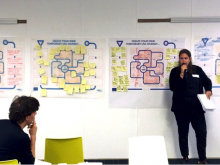Finland
The challenges posed to urban development in Finland arise from the nation-specific facts of the young urbanisation, cities as strong economic actors and link to regional development. The main urban issues are acceleration of new wealth and growth, sustainable urban structure (related to climate change) and increasingly, social cohesion. Housing policy in growth centres poses a particular issue, as well as fragmented municipal structure within the functional city regions, creating obstacles to well-working governance.
Currently, urban development policy has taken new strengthened steps in Finland. The major cities are being more systematically used as engines of growth of regions and the whole country. 12 major urban regions comprise 67% of the national GDP and nearly 90% of Finland’s R&D inputs. The partnership between the government and cities is in place. Growth agreements in major cities have been made to reinforce city-regions’ competitiveness and economic resilience, land use, housing and transportation as well as social sustainability. Growth agreements are closely conducted with another initiative by the government, Innovative Cities Programme (INKA). Innovative Cities is a tool for cities’ innovation policy.
SOME RELATED NETWORKS
CityRegion.Net
RU:RBAN Second Wave
VILAWATT
National URBACT Points
University of Eastern Finland (Karelian Institute)
Contact: Petri Kahila
Article
Digital Transition in cities – how can it benefit citizens?
Article
REFILL@LILLE: Policy Design Labs and URBACT exchange networks
Article
Bringing (more) sustainability to cities: 5 golden rules
Article
ACTive NGOs: platforms for public-civic cooperation
News







